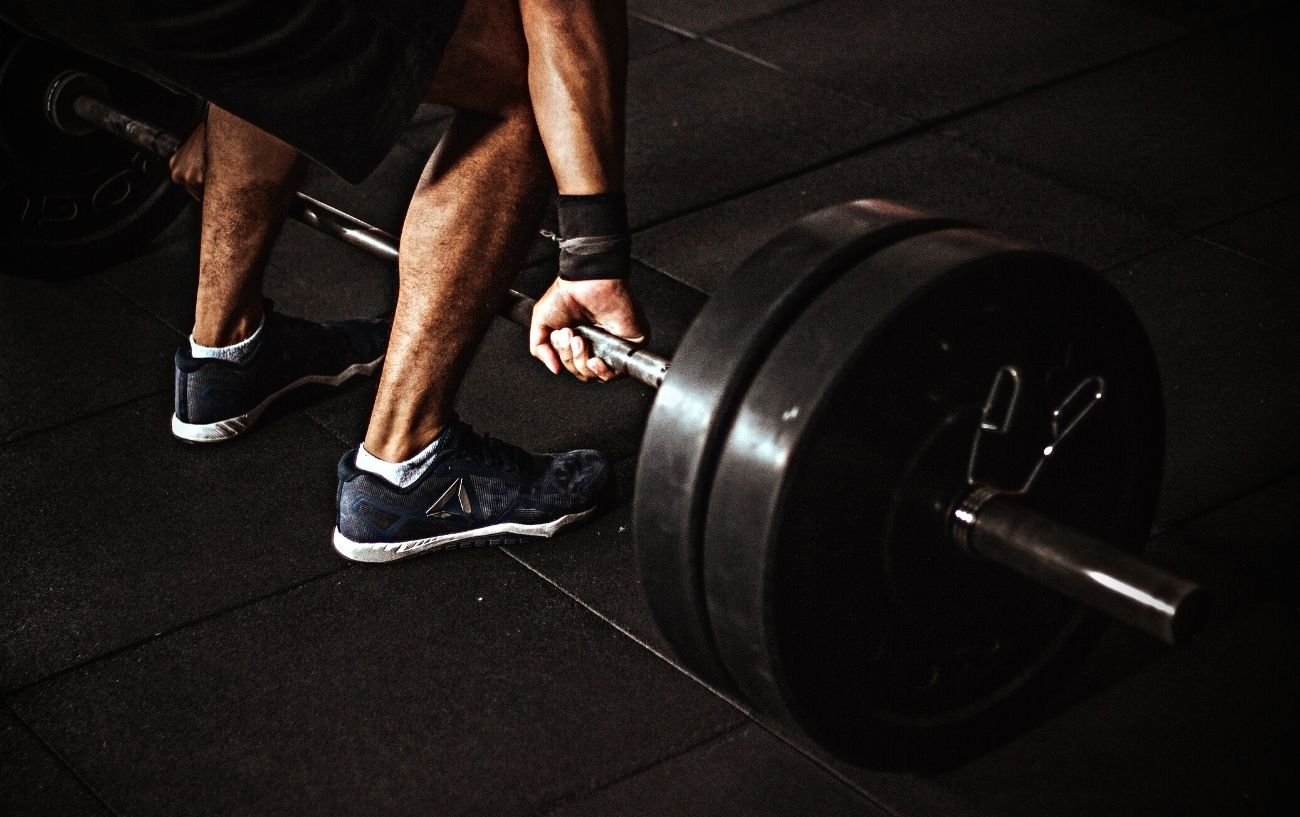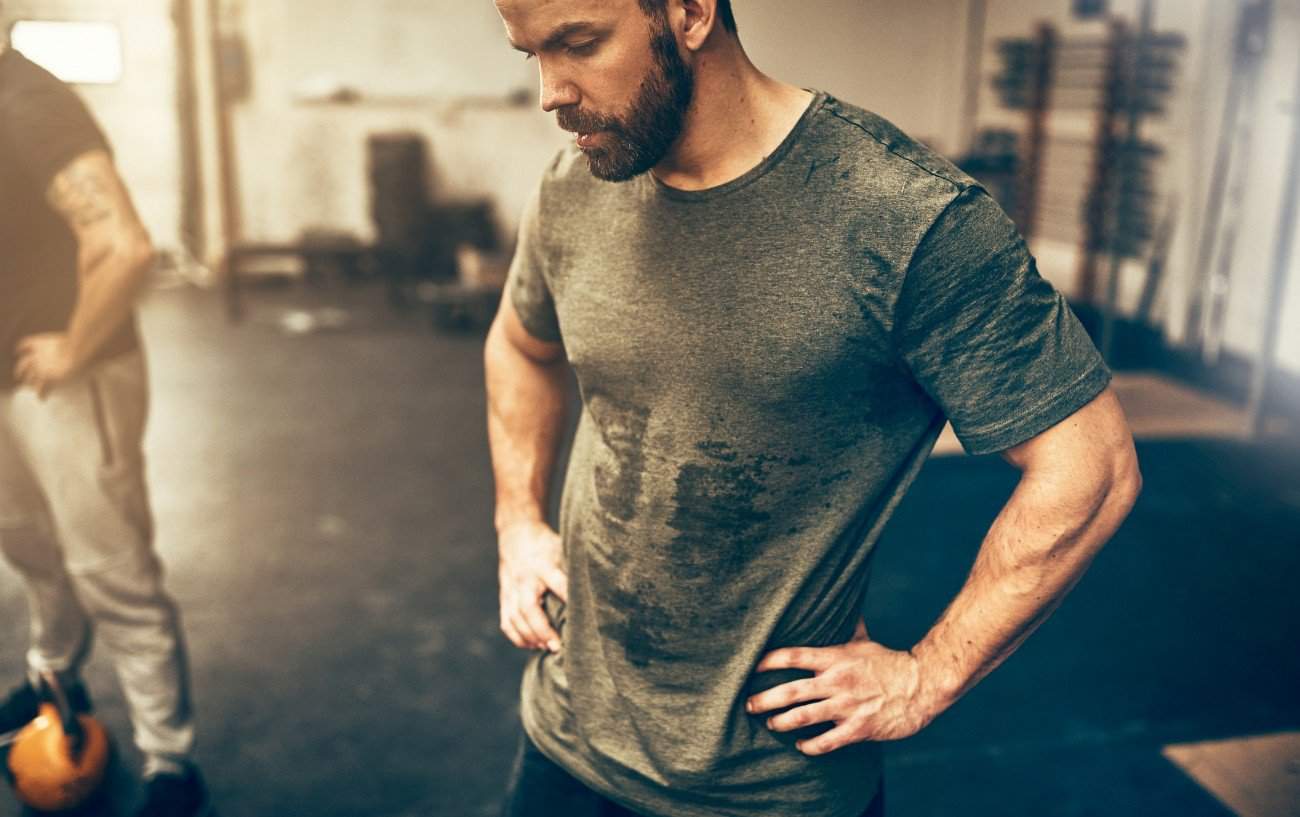To date, there aren’t readily available research studies that have directly compared the health benefits of being able to do a certain number of push-up reps per minute to the health risks of being unable to do a certain number of push-ups per minute.
However, there can still be value in assessing how many push-ups you can do in a minute.
In this article, we will discuss why the number of push-ups you can do in a minute can be a useful fitness benchmark, the average number of push-ups in a minute by age, sex, and fitness level, and ultimately answer your question, “What’s a good number of push-ups in a minute?”
Let’s dive in!

Does It Matter How Many Push-Ups I Can Do In a Minute?
Before we look at what might be considered a good number of push-ups in a minute or the average number of push-ups a minute by age and sex, it can be helpful to discuss why you should care.
Health
Firstly, while there may not be data specifically looking at the number of push-ups a minute you can do and its impact on your physical health, there is some evidence to suggest that there is a significant association between the number of push-ups you can do in general and your risk of future cardiovascular disease or adverse cardiovascular events.
For example, one 10-year study that followed middle-aged male firefighters (average age 39) found that men who were able to do at least 40 push-ups a day were 96 percent less likely to experience a cardiovascular event over the 10 years of the study than men who could only do no more than 10 push-ups.1Yang, J., Christophi, C. A., Farioli, A., Baur, D. M., Moffatt, S., Zollinger, T. W., & Kales, S. N. (2019). Association Between Push-up Exercise Capacity and Future Cardiovascular Events Among Active Adult Men. JAMA Network Open, 2(2), e188341. https://doi.org/10.1001/jamanetworkopen.2018.8341
This is certainly supportive evidence of the benefits of being able to do more push-ups. However, it is important to understand that this is a correlation study, not a causation study.
This means that men who were able to do more push-ups experienced more favorable cardiovascular health outcomes than men who could do fewer push-ups at baseline.

However, there was no intervention or a controlled trial that isolated the relationship between push-up workouts or push-up abilities and health outcomes.
There may have been other lifestyle and behavioral factors that contributed to the significant reduction in cardiovascular disease and cardiovascular events.
That said, this finding is a compelling tidbit of evidence pointing to the benefits of being able to do more push-ups.
Plus, on a more scoping view of exercise and resistance training for health, there have been plenty of studies that have found that being more physically active—and engaging in consistent strength training specifically—can improve various markers of health.2Westcott, W. L. (2012). Resistance training is medicine: Effects of strength training on health. Current Sports Medicine Reports, 11(4), 209–216. https://doi.org/10.1249/JSR.0b013e31825dabb8
Moreover, when you think about the type of fitness you need to do a good number of push-ups in a minute, you need good muscular endurance, relative strength for your body weight, and some amount of cardio endurance.
Thus, in general, people who can do more push-ups in a minute are likely to be fitter, have a lower body fat percentage, and be consistent exercisers to build the necessary muscular and aerobic endurance for a good number of push-ups in a minute.
These factors and physical activity practices are all likely to contribute to better health outcomes, reduced risk of disease, and overall improved well-being over someone who can do only a few push-ups in a minute before fatiguing.

Benchmarking Progress
Finally, aside from the potential health benefits of being able to do a “good number of push-ups in a minute,“ there is value in testing yourself periodically to see how many push-ups you can do in a minute.
Fitness tests that have a defined objective and time frame—in this case, doing as many push-ups as you can in 60 seconds—are a great way to have a repeatable fitness benchmark that you can return to periodically assess the effectiveness of your strength training workouts and fitness routine overall.
For example, you might do a 60-second push-up test towards the beginning of your strength training program or fitness journey and find that you can only do 5 full push-ups in a minute before you would either need to do push-ups on your knees or stop altogether.
You could retest how many push-ups you can do in a minute 4 to 6 weeks later, after strength training 2 to 3 times per week.
This push-up retest would allow you to see how many more push-ups you can do in a minute after training.
Then, you can keep implementing routine 1-minute push-up tests every 4 to 6 weeks throughout your training program to gauge your improvements.

If you find that you are not able to do that many more push-ups in 60 seconds despite consistent training, you might need to tweak your strength training program to better meet your fitness goals and current ability level.
It’s worth mentioning that this type of evaluation using the push-up test will only have significant value if you are doing upper-body strength training workouts, particularly those targeting the pushing muscles.
Furthermore, if you are already able to do an above-average number of push-ups in a minute for your age and sex, you may not see significant increases in your push-up test score.
Like most physical abilities, there will be a ceiling or a maximum number of push-ups in a minute that most people will be able to do regardless of their fitness level, push-up workout plan, age, strength-to-weight ratio, etc.
As you approach this maximum number of push-ups in a minute, it will be much harder to do more push-up reps in 60 seconds simply due to the limitations of the 60-second timeframe and the time it takes to do a full push-up with proper form.

How to Test How Many Push-Ups In a Minute You Can Do
Before we look at answering the questions: “What is a good number of push-ups in a minute for men?” and “What is the average number of push-ups in a minute women can do?” let’s cover how to determine how many push-ups you can do in a minute.
Of course, it sounds straightforward enough, but from my experience working as a certified personal trainer, I have found that a surprising number of people think that they are performing push-ups properly and are failing to either use the correct push-up form or are truncating the range of motion.
If you’re not using the proper push-up technique when you are counting your push-up reps in a minute, there will be little value in comparing your push-up test results to any push-up test norms.
According to the American Society of Exercise Physiologists (ASEP), the push-up test assesses your upper-body muscular endurance and is performed to failure.3Push-Up Test. (n.d.). Retrieved November 28, 2023, from https://www.asep.com/courses/asep-651/offic_aids/oa_08_03.pdf

Failure is considered to be reached once you can no longer perform push-ups without stopping to rest or without compromising your form and technique.
For fit athletes, this may be longer than one minute if you are able to continue performing push-ups at an even cadence beyond 60 seconds before fatigue.
However, you can still perform a 1-minute push-up test to count how many push-ups you can do in a minute.
You should be performing the push-ups with the full range of motion with as much consistency in the tempo or rhythm as possible.
Many people believe that they are performing push-ups with the proper technique, but they often fail to use the full range of motion.
The correct push-up technique involves bending your elbows and lowering your chest to the ground until your elbows are at least 90° and then pressing all the way back up until your elbows are extended.

How Many Push-Ups Should I Be Able to Do In a Minute?
The norms for push-ups in a minute are higher for men than for women because studies have found that men typically have a greater strength-to-weight ratio because they have more lean body mass and lower body fat percentage than women.4Rozenek, R., Byrne, J. J., Crussemeyer, J., & Garhammer, J. (2021). Male-Female Differences in Push-up Test Performance at Various Cadences. Journal of Strength and Conditioning Research, Publish Ahead of Print. https://doi.org/10.1519/jsc.0000000000004091
Additionally, there are differences in relative limb length and the body fat and muscle distribution in men vs women, both of which also contribute to higher average push-ups in a minute for men vs women.
What’s A Good Number Of Push-Ups In A Minute That Men Should Be Able to Do?
According to Topend Sports, here are the push-up standards for men based on age doing the 1-minute push-up test:5Wood, R. (2008). Push Up Test: Home fitness tests. Topendsports.com. https://www.topendsports.com/testing/tests/home-pushup.htm
| Age | 17-19 | 20-29 | 30-39 | 40-49 | 50-59 | 60-65 |
| Excellent | > 56 | > 47 | > 41 | > 34 | > 31 | > 30 |
| Good | 47-56 | 39-47 | 34-41 | 28-34 | 25-31 | 24-30 |
| Above average | 35-46 | 30-39 | 25-33 | 21-28 | 18-24 | 17-23 |
| Average | 19-34 | 17-29 | 13-24 | 11-20 | 9-17 | 6-16 |
| Below average | 11-18 | 10-16 | 8-12 | 6-10 | 5-8 | 3-5 |
| Poor | 4-10 | 4-9 | 2-7 | 1-5 | 1-4 | 1-2 |
| Very Poor | < 4 | < 4 | < 2 | 0 | 0 | 0 |

What’s A Good Number Of Push-Ups In A Minute That Women Should Be Able to Do?
According to Topend Sports, here are the push-up standards for women doing the 1-minute push-up test.
Note the two lines for push-ups in a minute for women by age.
The top line is the push-up test scoring for the number of full push-ups in a minute for females and the second line shows the push-up test scores for females when performing kneeling push-ups.
| Age | 17-19 | 20-29 | 30-39 | 40-49 | 50-59 | 60-65 |
| Excellent (Full Push-Ups from Feet) | > 30 | > 32 | > 28 | > 20 | > 16 | > 12 |
| Excellent (Modified Kneeling Push-Ups) | > 35 | > 36 | > 37 | > 31 | > 25 | > 23 |
| Good (Full Push-Ups from Feet) | 22-30 | 24-32 | 21-28 | 15-20 | 13-16 | 10-12 |
| Good (Modified Kneeling Push-Ups) | 27-35 | 30-36 | 30-37 | 25-31 | 21-25 | 19-23 |
| Above Average (Full Push-Ups from Feet) | 11-21 | 14-23 | 13-20 | 10-14 | 9-12 | 6-9 |
| Above Average (Modified Kneeling Push-Ups) | 21-27 | 23-29 | 22-30 | 18-24 | 15-20 | 13-18 |
| Average (Full Push-Ups from Feet) | 7-10 | 9-13 | 7-12 | 5-9 | 4-8 | 3-5 |
| Average (Modified Kneeling Push-Ups) | 11-20 | 12-22 | 10-21 | 8-17 | 7-14 | 5-12 |
| Below Average (Full Push-Ups from Feet) | 4-6 | 5-8 | 3-6 | 2-4 | 2-3 | 2 |
| Below Average (Modified Kneeling Push-Ups) | 6-10 | 7-11 | 5-9 | 4-7 | 3-6 | 2-4 |
| Poor (Full Push-Ups from Feet) | 1-3 | 1-4 | 1-2 | 1 | 1 | 1 |
| Poor (Modified Kneeling Push-Ups) | 2-5 | 2-6 | 1-4 | 1-3 | 1-2 | 1 |
| Very Poor (Full Push-Ups from Feet) | 0 | 0 | 0 | 0 | 0 | 0 |
| Very Poor (Modified Kneeling Push-Ups) | 0-1 | 0-1 | 0 | 0 | 0 | 0 |

If you find that you are below average in the number of push-ups in 60 seconds you can do with proper form, you aren’t alone. According to a 2021 survey of 2,000 people conducted by Gymless.org, 53.8 percent of adults are unable to do more than 10 push-ups in a row.6Chadwick, P. (2021, September 1). Nationwide Survey Results: The Majority of Americans Cannot Do More Than 10 Consecutive Pushups. Gymless. https://www.gymless.org/nationwide-survey-results-the-majority-of-americans-cannot-do-more-than-10-consecutive-pushups/
Depending on your sex and age, 10 push-ups in a minute would still not be a “good number of push-ups in a minute.”
On the bright side, like most aspects of fitness, you can improve your push-up test score with consistent training for the muscles worked by push-ups coupled with engaging in a generalized, well-rounded workout routine.
Check out our push-up progression plan here to help you train your way to better push-up strength.













